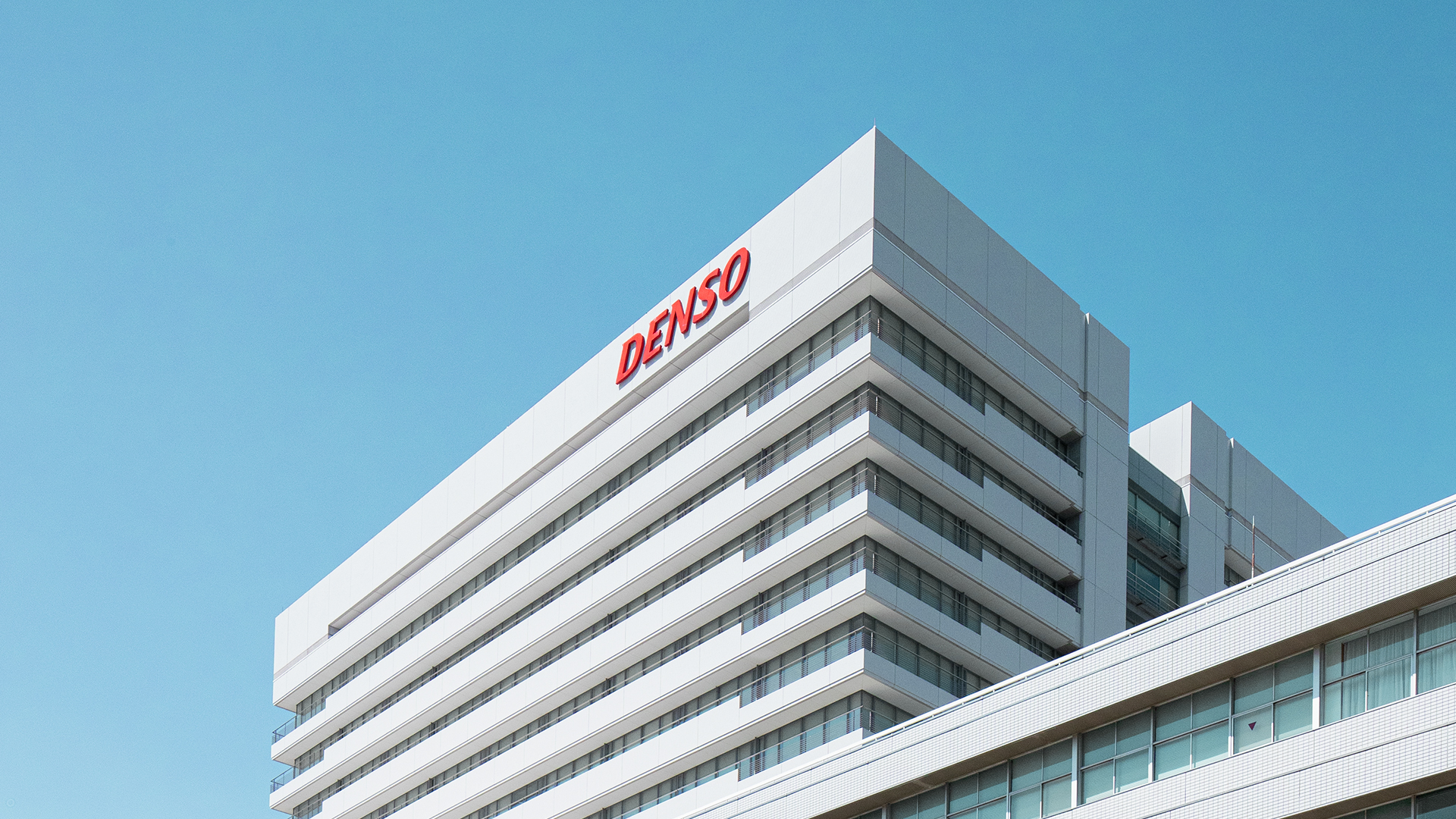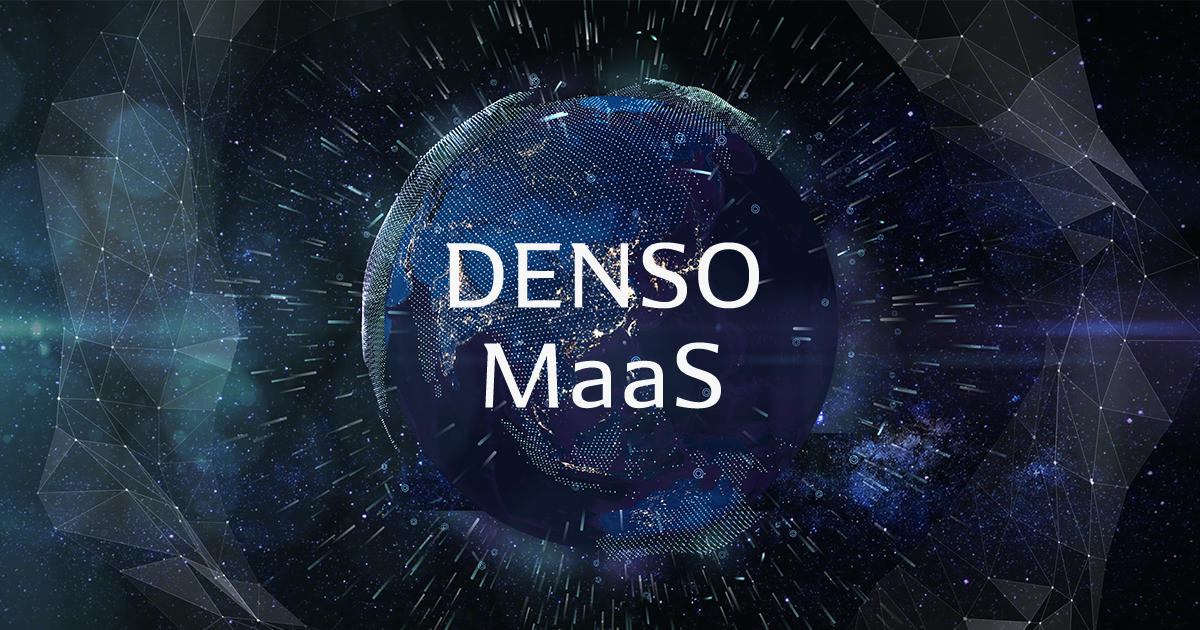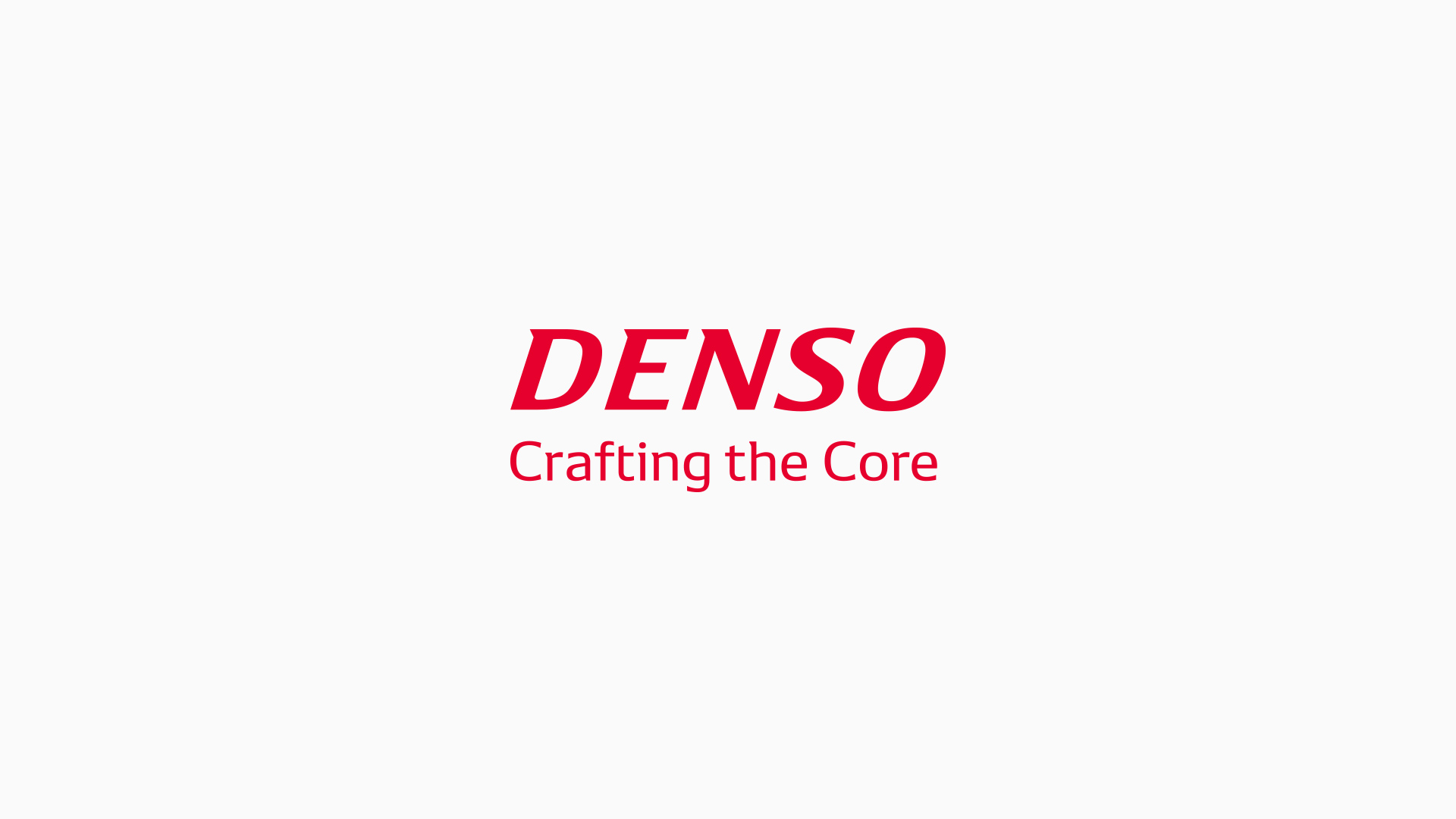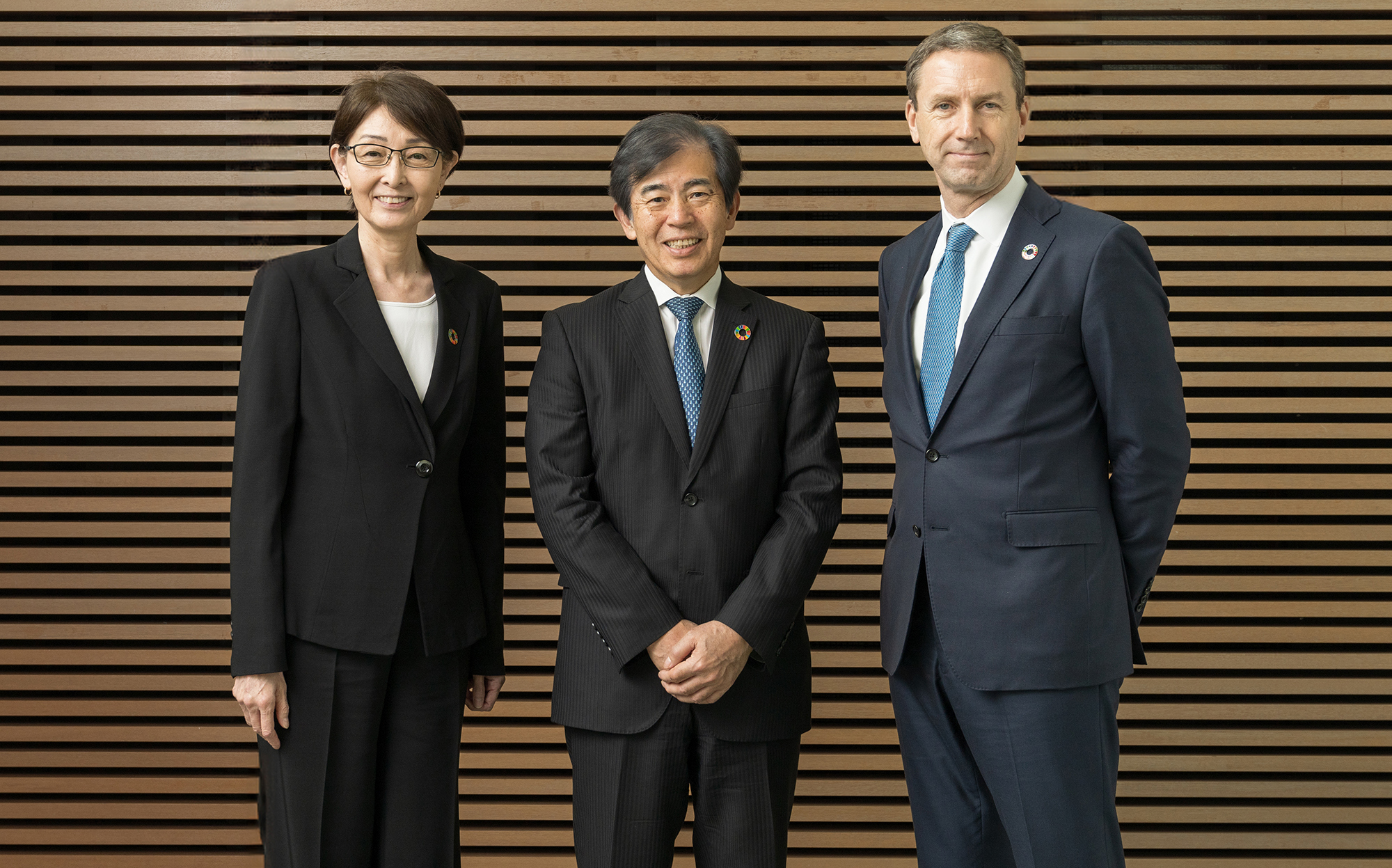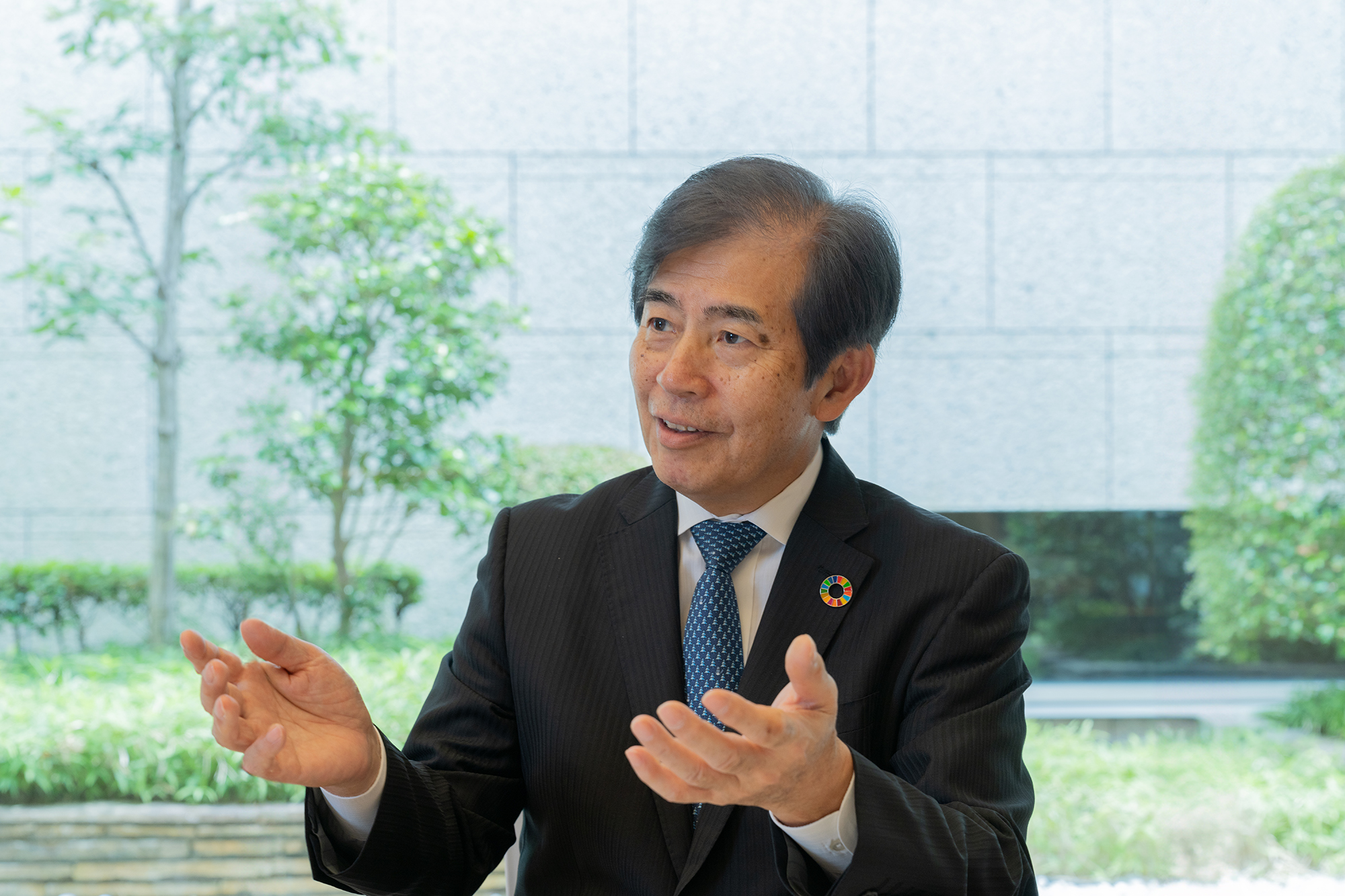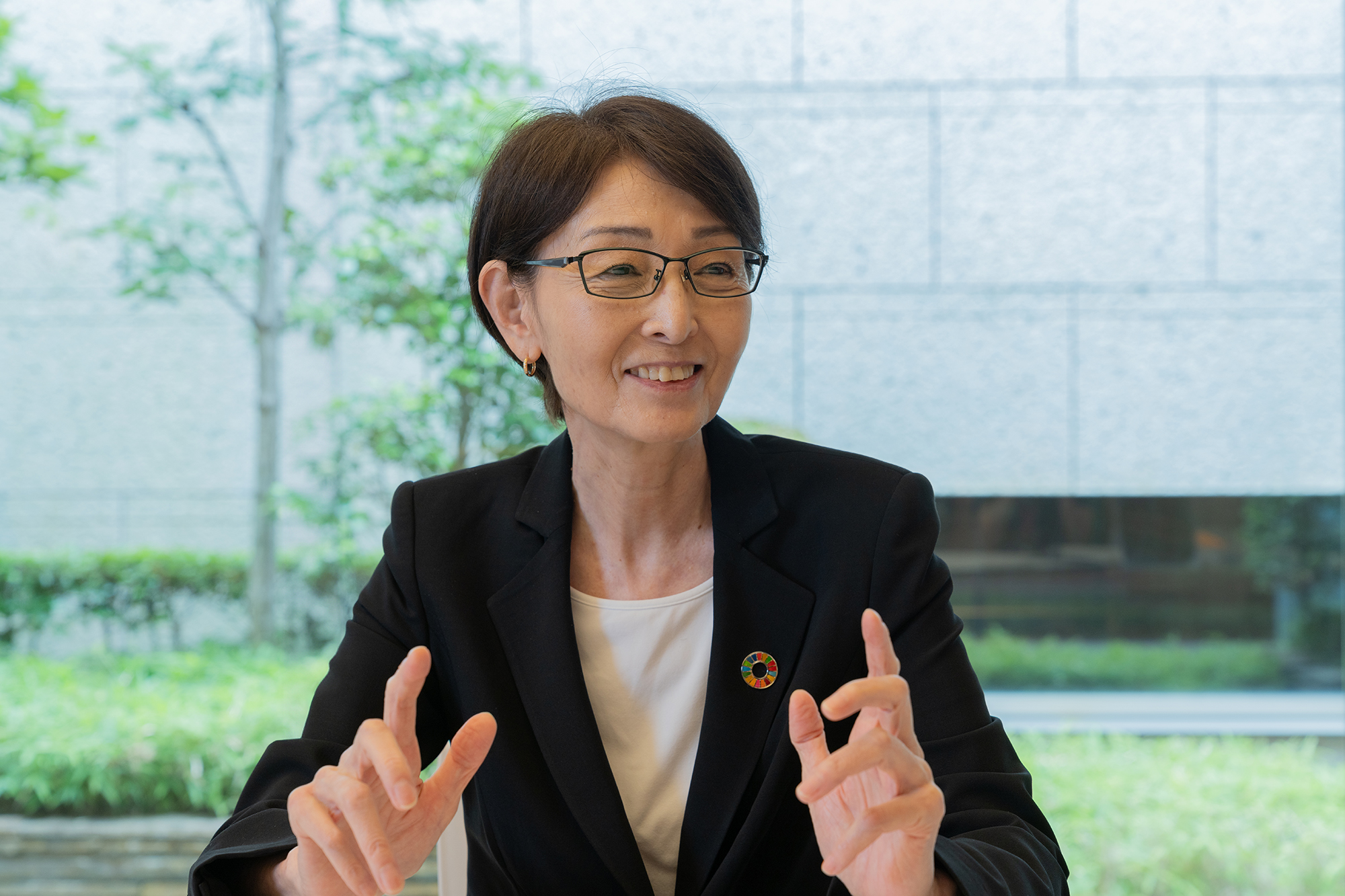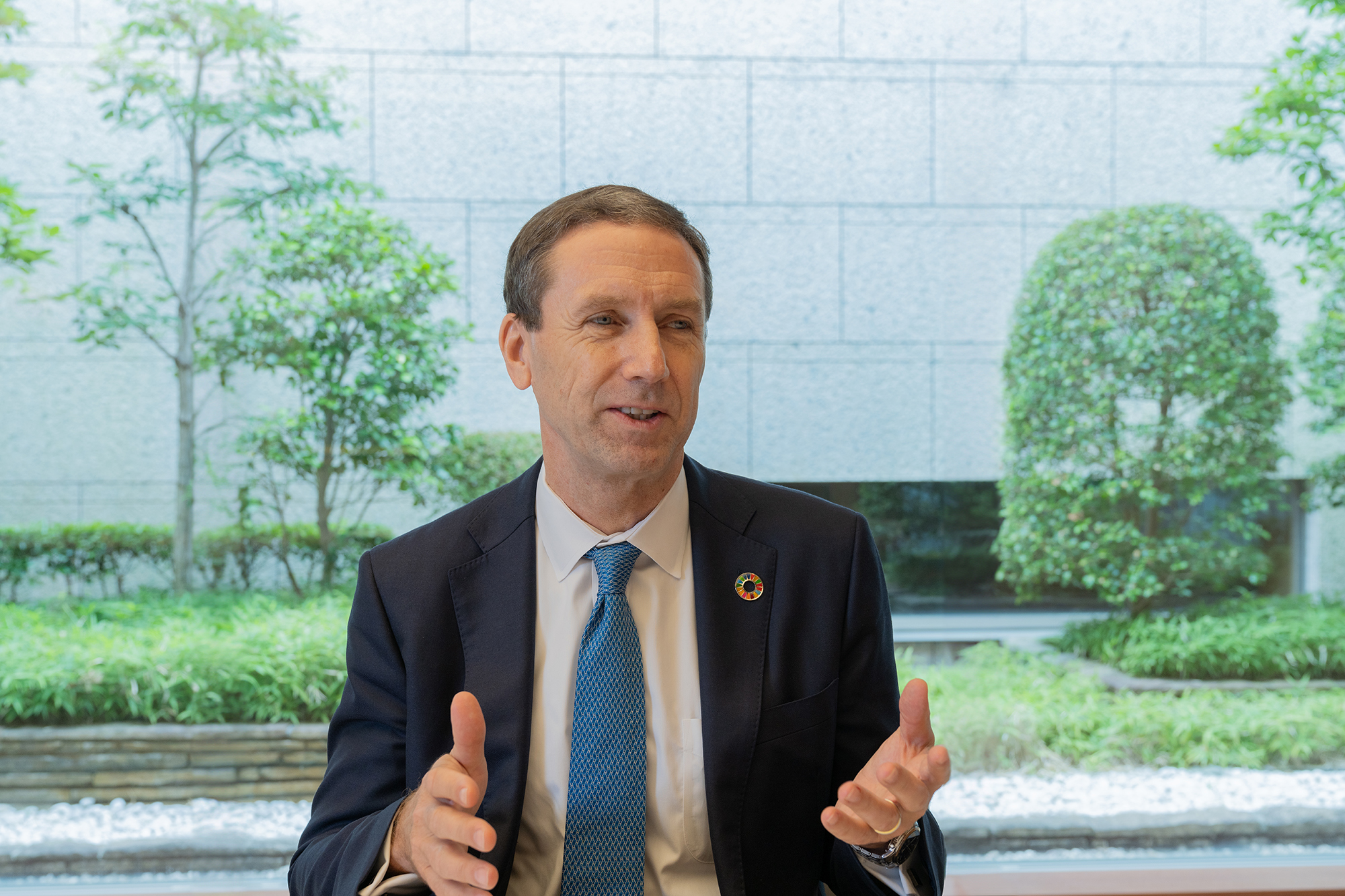Dialogue with the Outside Board Members
Accelerating Governance Reforms to Realize Management That Is Open to Society and Markets
DENSO’s governance is now at a major turning point as the Company transitions to a new management system and drastically reduces cross-shareholdings. The Company’s three independent outside Board members, who were deeply involved in a series of officer appointments and governance reforms, discuss the various issues currently facing DENSO from a range of objective perspectives.
-
Yuko Mitsuya
Outside Board MemberMs. Mitsuya has been serving as an outside Board member at the Company since 2019. She also serves as representative director of PIT Co., Ltd. and has a long history in the sports world.
-
Shigeki Kushida
Outside Board MemberMr. Kushida has been serving as an outside Board member at the Company since 2019. He also serves as representative executive officer & president at Japan Securities Finance Co., Ltd., and has experience working at the Bank of Japan.
-
Joseph P. Schmelzeis, Jr.
Outside Board MemberAfter serving in such positions as corporate director at SEGA CORPORATION and senior advisor to the ambassador at the U.S. Embassy in Tokyo, Mr. Schmelzeis currently works as executive manager at Cedarfield Godo Kaisha. He was appointed as outside Board member of DENSO in 2022.
DENSO in a Transitional Phase of Reform
Kushida Amid drastic changes in the external business environment and in-house operational conditions, DENSO is steadily moving forward with initiatives that require a great deal of effort, including the replacement of portfolio businesses and the disposal of a large number of cross-shareholdings. The Company is also earnestly responding to society’s expectations of a listed company by revising the officer compensation system and raising the salaries of general employees. In addition, when Shinnosuke Hayashi became president & COO (currently president & CEO) in 2023, he set out a bold vision of the future that encompasses fundamental technologies, semiconductors, software, and the creation of new value. Going forward, I anticipate discussions on more-concrete measures.
Mitsuya DENSO is in a phase of transitioning from internal combustion engine (ICE) products, which have supported the Company until now, to the electrification domain and other future growth businesses. Although this is an extremely challenging time for the Company, it is advancing far-sighted human resource management while remaining mindful of employee motivation. These initiatives are a clear testament to DENSO’s seriousness as well as the open organization created in response to quality issues. On the other hand, I believe that the realization of forward-looking strategies is the next big task.
Schmelzeis DENSO’s genuine corporate culture is creating a positive cycle in society. For example, the Company has maintained the soundness of the supply chain through price pass-on, taken into consideration shareholders and a wide range of other stakeholders, and raised employee salaries. The replacement of portfolio businesses is a difficult task, like changing the tires of a car while it is running. However, DENSO deserves credit for such concerted Companywide efforts.
New Three-Leader Management System
Kushida The new management system that began in 2023 has been further bolstered in 2024 by having two executive vice presidents, Yasuhiko Yamazaki and Yasushi Matsui, support the president & CEO, Shinnosuke Hayashi. President & CEO Hayashi is a leader whose ability to communicate drives DENSO forward. In contrast, Executive Vice President Matsui has the financial acumen necessary for business planning and portfolio management. Meanwhile, Executive Vice President Yamazaki is in charge of formulating technology strategies—such as strategies to ensure the superiority of the Company’s Monozukuri—while conducting business management in a manner that contributes to human resource development and organization building. In this way, the executive vice presidents support the president & CEO with respect to organizational management. I believe that each of these three individuals is able to demonstrate his particular strengths, thereby creating an extremely well-balanced team.
Mitsuya DENSO’s senior management team overturns the common belief that senior officers should be generalists. Given the global scale of the Company’s operations and the volatility of the times, the formation of a team of complementary senior officers expedites decision-making that is based on a broader perspective. The two executive vice presidents are specialists in their fields. I feel that they work well together and have an easy-going relationship in which they can discuss anything with each other. Meanwhile, the president & CEO focuses on effectively communicating his message. In 2023, the Executive Nomination and Remuneration Council expressed the opinion that the president & CEO should have excellent support, and I believe that the current senior management team is outstanding and fully satisfies this requirement.
Schmelzeis I agree with you. For one person to face the many strategic issues requiring a high level of expertise would be challenging. The new senior management team allows Executive Vice President Matsui to cover strategy quantification, fundraising, and investor relations, while President & CEO Hayashi and Executive Vice President Yamazaki concentrate on core strategies for competitiveness and technologies. The new team functions as a true triumvirate and meets, or even surpasses, the expectations of the Executive Nomination and Remuneration Council. As DENSO endeavors to realize the Mid-term Policy for 2025 in the coming crucial period, I hope that the team will advance an array of reforms while drawing on Chairman Arima’s experience and personal connections.
Enhanced Effectiveness of the Board of Directors
Kushida In 2023, Koji Arima, who had served as president & CEO and chaired the Board of Directors, was appointed chairman & CEO. In 2024, the CEO position was transferred to Hayashi, which has enabled Arima to speak with a more industry-wide perspective. In terms of governance, this change means a separation of supervision and execution and strengthens the supervisory function of the Board of Directors. I believe that Chairman Arima himself is fully aware of the separation of the supervision and execution in relation to facilitating the proceedings of the Board of Directors.
Mitsuya The occasions when Chairman Arima asks President & CEO Hayashi as the leader of the executive side for his comments at meetings of the Board of Directors are symbolic. After receiving explanations from the executive side, the president & CEO explains the essence of the agenda item from a comprehensive viewpoint and in a very clear and logical manner. This helps us to understand the intentions of the executive side and to appreciate the leadership exercised by President & CEO Hayashi on the executive side.
Schmelzeis Separation of the positions of chairperson of the Board of Directors and president has the benefit of adding one more person to the executive side and giving the senior management team some room to breathe. I feel that the governance system has become very good, with each inside officer showing an ability to perform in ways that surpass the limits of their previous roles.
Mitsuya There was an incident that made me keenly aware of our role as outside Board members. The discussion of a certain business strategy plan became unprecedentedly heated. In fact, it was so heated that the discussion was split into two or three sessions. The executive side had spent time developing a plan at the Management Strategy Meeting and the Management Deliberation Meeting, and they must have felt confident about it. However, in our position, which does not have ties to the Company, we must first consider the Company’s risks. I believe that acting in such a manner is an important obligation both with regard to the Company and its shareholders.
Schmelzeis In the process of reaching the Board of Directors as agenda items, proposals inevitably develop in-house momentum and become part of plans premised on their approval. The Board of Directors is the last gatekeeper able to say “no” to such proposals. As members of the Board, we do not just choose between agreeing or disagreeing with proposals. We conduct detailed, sound discussions in light of the risks involved.
Kushida In principle, the Board of Directors, which is a supervisory body, should make decisions on important issues relating to the direction of the Company. The Management Deliberation Meeting certainly includes inside Board members who hold both executive and supervisory positions. That said, if any proposal were able to in effect receive approval through this meeting, the Company’s decision- making process would be flawed. To achieve a more substantive separation of supervision and execution, we should seek a governance structure in which the Board of Directors exercises authority over management strategies and large investment projects but expedites matters by delegating authority for more detailed issues to the executive side.
Toward Market-Oriented Management
Kushida
One of the major steps DENSO took in 2023 was the reduction of cross-shareholdings, including shares of companies belonging to the Toyota Group. This is a good example of DENSO’s senior management team showing their strong conviction by raising a concern and then steadily achieving results based on a series of discussions within the Group.
Going forward, the treatment of Toyota Motor Corporation shares will be the focus. To date, the market’s evaluation of the reduction of cross-shareholdings has been very positive overall. Cross-shareholdings are viewed as an inherent part of supply chains not only in Japan’s automotive industry but also among the country’s manufacturers generally. I think DENSO’s efforts to change this from within have been well received. This initiative should be steadily continued, which I believe is the executive side’s policy.
Mitsuya My understanding is that decisions on the merits and demerits of cross-shareholdings are being made in line with certain criteria and guidelines. We have received a clear explanation from the executive side that the dissolution of cross-shareholdings with the Toyota Group companies will not damage the long-standing relationship between DENSO and the Toyota Group. The process is a major step toward market-oriented business management, and I view the policy in a positive light.
Schmelzeis In the history of listed companies’ governance in Japan, the disposal of cross-shareholdings by companies marks a very important turning point. Non-Japanese investors’ strong endorsement of the unwinding of cross-shareholdings is noteworthy. I do not believe that all shares of Toyota Group companies should be disposed of right now, but I recognize that the reduction of cross-shareholdings is a sound move and the right direction in which to be heading.
Essence of Sustainability Activities
Kushida
When a sustainability evaluation was introduced into the officer compensation system in fiscal 2023, the setting of the sustainability KPIs that were to be used became a focus. For the sake of workability, we began by narrowing down the number of KPIs for material issues (Materiality). At present, the Company has decided to incorporate its Materiality into the next mid-term policy. In the current preparatory stage, a large number of material issues have been compiled. We must take heed of the previous discussions of the Executive Nomination and Remuneration Council and ensure that the KPIs are highly workable.
The numerous material issues that companies are currently facing are partly an inevitable consequence of complying with new European rules on disclosure. However, the main idea is to use social issues and businesses that are important to DENSO as the two axes of efforts to narrow down the themes that should be focused on and then create and incorporate KPIs accordingly. Initiatives that do not have an affinity with or stem from the core of business management will not be sufficiently workable and will not increase corporate value.
Mitsuya
In its own right, the introduction of KPIs is of great significance. The current sustainability KPIs are not in their final form. In an ongoing process of trial and error, they will be discussed at the Executive Nomination and Remuneration Council and other meetings.
The use of ESG figures in isolation, before their linkage to core businesses has been clarified, would be putting the cart before the horse. The simple issuance of figures is not enough. DENSO should issue figures that it has fully analyzed and internalized and clearly explain why it is emphasizing the figures and what it hopes to achieve by reaching certain numerical targets. Moreover, if a target is not achieved, the cause should be identified and a fundamental reexamination should be undertaken. On the other hand, if initiatives are already in place, being overly focused on the announcement of numerical targets seems unnecessary.
Kushida I certainly think that the essence of targets should be analyzed in depth and verbalized. However, in order to monitor the progress of the initiatives, I believe we need KPI-based management. I could not agree more that we should go back to basic objectives and fundamentally review figures that are far removed from actual situations.
Ideal Mid-Term Policy
Kushida
Even though it is too early to look back on the achievements under the Mid-term Policy for 2025, at this point the Company is certainly falling behind in the area of new value creation. However, this delay is apparent only because we have set clear targets for consolidated revenue and other metrics, without which we would not be able to judge the progress of initiatives. We must consider the positioning of the mid-term policy in greater depth.
In general, when formulating a medium- to long-term plan, completely foreseeing the market four or five years into the future is challenging. Even in recent memory, there have been a series of events, such as the COVID-19 pandemic and the semiconductor shortage, that far exceeded our prior assumptions. We must respond flexibly to such major changes in the environment. At a time that calls for the rapid execution of responses, the Board of Directors should not engage in endless discussions about execution.
To ensure that the benefits of separating supervision and execution are not diminished, the speed of execution should be increased through delegation of authority, while the Board of Directors should hold discussions that are sharply focused on a narrowed down set of issues. DENSO’s governance has definitely improved in recent years, but I think room remains for further improvement.
Mitsuya
Certainly, both society and DENSO have changed dramatically over the past five years. There was the implementation of “Reborn21,” a transformation plan established in response to quality issues. Formulated in 2022, the Mid-term Policy for 2025 integrates several earlier plans, including “Reborn21.” When these earlier plans were formulated, foreseeing the changes in society and DENSO would have been impossible.
On the other hand, from a steep decline five years ago the Company’s performance has recovered rapidly, with consolidated revenue reaching record highs for three consecutive years. Quite apart from the Company’s progress toward the plan’s targets, this resilience and ability to recover deserves praise.
Schmelzeis One test for the senior management team will be how concrete the next mid-term policy is. The ongoing discussions are still at the brainstorming stage, with ESG-related keywords flying around, but the question is how to refine them and incorporate them into concrete targets for the next five, 10, or 15 years. I would like to actively participate in and contribute to these discussions, which are about to get into full swing.



